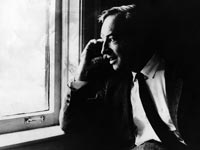Saul Bellow Writes a Love Letter, and Considers Heaven

This week’s New Yorker contains extraordinary, and extremely moving, letters written by Saul Bellow to other novelists. Bellow was, for many critics and readers, primus inter pares in American twentieth century fiction: there will never be another like him. His letters are witty; this is no surprise. What is notable is their emotional depth, and perhaps their increasing emotional depth as Bellow aged. One written near the end of his life, to English author Martin Amis, contains a spectacular meditation in miniature on grief, and in particular on the loss of a parent.
Amis looked up to Bellow. Amis’s father, Kingsley, died in October of 1995; in March of 1996, this is what Bellow—nine years before his own death—wrote to his “dear Martin,” comparing himself and his failings to those of Kingsley:
I’ve become forgetful, too. Nothing like your father’s nominal aphasia. I find I can’t remember the names of people I don’t care for—in some ways a pleasant disability. I further discover that I would remember people’s names because it relieved me from any need to think about them. Their names were enough. Like telling heads.
I can guess how your father must have felt at his typewriter, with a book to finish. My solution is to turn to shorter, finishable things. I have managed to do a few of those. Like learning to walk again—but what if what one wants, really, is to run?
I am sure you have thought these things in watching your father’s torments.
Last Saturday I attended a memorial service for Eleanor Clark, the widow of R.P. Warren. I found myself saying to her daughter Rosanna that losing a parent is something like driving through a plate-glass window. You didn’t know it was there until it shattered, and then for years to come you’re picking up the pieces—down to the last glassy splinter.
Of course you are your father, and he is you. I have often felt this about my own father, whom I half expect to see when I die. But I believe I do know how your father must have felt, sitting at his typewriter with an unfinished novel. Just as I understand your saying that you are your dad. With a fair degree of accuracy I can see this in my own father.
There are other letters printed here, ones in which Bellow parses reviews with Trilling and Roth, apologizes for abruptness at an Academy Dinner to Cynthia Ozick, and expresses his unique sense of connection to John Cheever. Yet the letter to Amis is the most powerful as it addresses not only Bellow’s sense of closeness to death but also his (“half”) expectation of Heaven. Maybe Heaven can remain theoretical until we lose someone we love. Then we know we need it; it’s our reward for recovering those pieces of glass.




